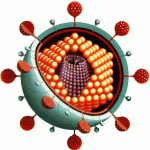Virology
|
29 august 2014 09:40:27 |
| Macrophage migration inhibitory factor engages PI3K/Akt signalling and is a prognostic factor in metastatic melanoma (Epidemiologic Perspectives & Innovations) |
|
Tweet Background:
Macrophage migration inhibitory factor (MIF) is a widely expressed cytokine involved in a variety of cellular processes including cell cycle regulation and the control of proliferation. Overexpression of MIF has been reported in a number of cancer types and it has previously been shown that MIF is upregulated in melanocytic tumours with the highest expression levels occurring in malignant melanoma. However, the clinical significance of high MIF expression in melanoma has not been reported.
Methods:
MIF expression was depleted in human melanoma cell lines using siRNA-mediated gene knockdown and effects monitored using in vitro assays of proliferation, cell cycle, apoptosis, clonogenicity and Akt signalling. In silico analyses of expression microarray data were used to correlate MIF expression levels in melanoma tumours with overall patient survival using a univariate Cox regression model.
Results:
Knockdown of MIF significantly decreased proliferation, increased apoptosis and decreased anchorage-independent growth. Effects were associated with reduced numbers of cells entering S phase concomitant with decreased cyclin D1 and CDK4 expression, increased p27 expression and decreased Akt phosphorylation. Analysis of clinical outcome data showed that MIF expression levels in primary melanoma were not associated with outcome (HR = 1.091, p = 0.892) whereas higher levels of MIF in metastatic lesions were significantly associated with faster disease progression (HR = 2.946, p = 0.003 and HR = 4.600, p = 0.004, respectively in two independent studies).
Conclusions:
Our in vitro analyses show that MIF functions upstream of the PI3K/Akt pathway in human melanoma cell lines. Moreover, depletion of MIF inhibited melanoma proliferation, viability and clonogenic capacity. Clinically, high MIF levels in metastatic melanoma were found to be associated with faster disease recurrence. These findings support the clinical significance of MIF signalling in melanoma and provide a strong rationale for both targeting and monitoring MIF expression in clinical melanoma. |
| 126 viewsCategory: Pathology, Virology |
 GPC3 reduces cell proliferation in renal carcinoma cell lines (Epidemiologic Perspectives & Innovations) GPC3 reduces cell proliferation in renal carcinoma cell lines (Epidemiologic Perspectives & Innovations)A selenosemicarbazone complex with copper efficiently down-regulates the 90-kDa heat shock protein HSP90AA1 and its client proteins in cancer cells (Epidemiologic Perspectives & Innovations) 
|
| blog comments powered by Disqus |
MyJournals.org
The latest issues of all your favorite science journals on one page
The latest issues of all your favorite science journals on one page



